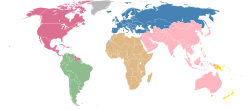This article needs additional citations for verification .(February 2024) |
This article lists all international competitions in women's football (soccer). The competitions included are for national teams as well as club sides. Competitions past and present are included. Some competitions may not be directly run by the governing body for the region.
Contents
For domestic competitions see the article Women's football around the world .
The inaugural FIFA Women's World Cup tournament was held in November 1991 [1] after the experimental FIFA Women's Invitation Tournament in 1988 inspired in three classic Women's competitions in the 70's and 80's: FIEFF Women's World Cup organized by FIEFF the 1st World Women's Football Governing Body and the invitational tournaments such as Women's World Invitational Tournament and International Ladies Football Festival.
